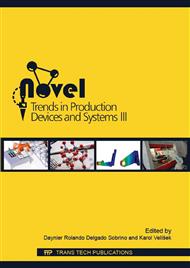p.262
p.270
p.278
p.288
p.298
p.307
p.316
p.324
p.334
Laboratory Tasks and Material and Safety Aspects
Abstract:
Manufacturing organisations deal with the measurement of various kinds and other types of laboratory tasks often during their production. However, employees should have learned already the laboratory preparation from schools. The legislation in the Czech Republic currently limits the possibility of teaching of laboratory tasks in schools with reference to kind of materials, to the occupational safety and to the minority or to a lack of expertise knowledge of students. It is so hard to prepare students professionally from position of teachers. The article deals with the construction of laboratory tasks in a material point and in a safety point of view. The teacher must look for necessary special materials for these tasks. Economic and ecologic aspects of materials mainly played an important role. It is important to approach tasks and an actual practice. It is necessary also to teach students to principles of the occupational safety at work with these materials. The article specifies nonconformities regarding to a used material and to security incidents. Recommendations for the improving of level of the teaching of laboratory tasks also from material point of view are presented here that are related to the practice.
Info:
Periodical:
Pages:
334-341
DOI:
Citation:
Online since:
August 2016
Authors:
Keywords:
Price:
Сopyright:
© 2016 Trans Tech Publications Ltd. All Rights Reserved
Share:
Citation:


